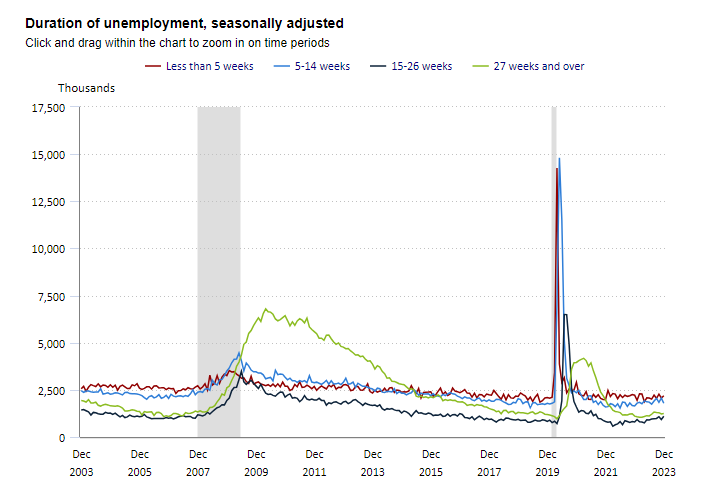Almost everyone has employment gaps and they’re not a big deal. But when does the employment gap become too big to have a good explanation for it?
Anything less than 5 months isn’t a big deal, because it happens to everyone. 6-12 months should be easy to explain, but anything beyond that needs a very good explanation. The longer you’re unemployed the better story you need to craft to present yourself as a good candidate.
Most employers don’t mind a small single gap, but even a long gap can be explained. All you need to do is try to frame those gaps to an employer as something positive, where you learned new skills or gained valuable experience.
One of the best answers for gaps in employment is either personal medical issues, freelancing, or finding a good fit for a job (for shorter gaps), but pretty much anything can be explained with a good enough explanation.
Disclaimer: Some of the links in this article are affiliate links that may provide me with a small commission at no cost to you. I only recommend only the best products and services. Read about affiliate disclosure in my privacy policy.
How Long Is Too Long to Be Unemployed?

Anything beyond 5 months is a potential red flag for employers and may hurt your chances of even getting an interview. However, as long as there is some legitimate reason for the gap, there shouldn’t be any problems, provided you can get that interview.
How much is acceptable will also depend on the field you’re in. Some interviewers won’t even ask about 2-3 months of employment gap, though some may press even a one-month pause.
Remember, the more you put off finding work, the harder it becomes. Eventually, having too long of a gap on a resume will not only cause anxiety and lack of confidence but it’ll be much more difficult to provide a good explanation for the gap.
What counts as an employment gap?
An employment gap is usually a period of about 3 or more months of unemployment, excluding recent graduates. However, just because you were unemployed for 2, 3, or 6 months doesn’t mean you didn’t learn anything during that time, and you can mention this in a resume or during an interview.
Are Employment Gaps Bad?
While it’s true that it’s usually better if you’ve been working than not working at all, not all employment gaps are bad. The only time employment gaps become a problem is if they paint a bad picture about you as a candidate for the open position.
Employers have come to understand that many people get laid off and have to work all kinds of jobs to make ends meet. These jobs are sometimes outside of your area of expertise, and there’s nothing bad about that.
No matter how long you’ve been unemployed, you can always turn it around and present it as something positive where you learned or improved something.
Is it OK to take a break between jobs?
Taking a few months off between jobs should be fine, and you can always assign this period on your resume to travel or freelancing if you need to. However, it’s always best to avoid being unemployed, but instead to delay the start date for a month or two.
Some companies don’t actually mind if you start later, just be upfront with the expectations for the start date. And when you leave the current company, remember that it’s always best to quit on good terms, and keep any potential future references.
Do employers care about gaps in employment?
Unfortunately, some hiring managers will consider employment gaps red flags and will immediately reject candidates for this reason. However, most of them are more interested in why you’re a great fit for the job and will want to hear you out first.
Employers want to see if you weren’t fired for some godawful reason, or if you’re too picky or quit for the most fragile of reasons. If you often jump between jobs a hiring manager will see this as a red flag, because you could just walk out from this job as well for no good reason.
They want reliable employees, for the long term. So what you need is to be able to sell yourself with a nicely tailored resume and a few well-prepared answers that paint a great story about you.
How Do You Overcome an Employment Gap?
To overcome the employment gap you need to treat your job hunting like a job itself. Learn how to tailor your resume and your cover letter to each job, practice the STAR technique for interviews and acquire skills online so you can put them on your resume.
Long-term unemployment can be difficult to overcome, but you can do it by crafting some kind of narrative of why you had that gap. The longer the gap the more you need to create some kind of spin on your life experience.
If the company decides to call you for an interview, they have already noticed your employment gap, but have still decided that you are worth an interview and a potential job. All you have to do is prepare by practicing that explanation for the gap.
Practice explaining your employment gap
You can apply part-time at companies such as USPS or UPS. While these jobs can be physically demanding, still pay well and have good benefits.
If your gap lasted for years, the fastest way to a job is to look for a temp agency or staffing company that will actively look into finding work for you. These agencies offer employment assistance that can give some great advice, help you prepare your resume, and deal with interviews.
What to do when you’ve been unemployed for over a year?
One of the most important things is to have a daily routine. Occupy your mind with self-development, applications to jobs, and improving your resume. You need to practice how to explain this employment gap during an interview, so you can be prepared for these questions.
Being unemployed for a year can be difficult, but unless you create a daily schedule and set aside a few hours for applications it will be even harder. Keep improving your resume constantly, learn online courses, and work out to always have the energy to keep moving.
Can I get a job after 3 to 5, or 10 years of gap?
To get a job after a few years of unemployment you should apply to any job you even remotely qualify for and ignore the rest of the requirements as they are usually just a wishlist. Additionally, you need to tailor your resume better and practice for interviews a bit.
Take your time, and remember applications can take time to get processed. During the interview, if they ask you about the gap, you should always try to turn it into a positive. Sometimes, if the company has a high enough turnover they won’t bother checking your resume.
You could try some of the companies with healthy work environments, such as Costco, or Trader Joe’s. These two are great companies, and I’m sure they will consider anyone who is willing to work in a team with a positive attitude.
What to do if you’re unemployed for 10 years?
The fastest way to find a job after so many years is by trying a temp agency or a staffing company, that can help you find work again. They have tests for Word, Excel, typing, and other products where you can prove that you have some skills.
In the meantime, you should brush up on your Microsoft products such as Word, Excel, and other software so you can prove to your employers you kept up with technology.
Look for entry-level jobs as most of them don’t care too much about your job history. You could also try and apply at a company with a high turnover rate where employees come and go much more often. While these jobs aren’t the most appealing, they aren’t the worst, and you’ll gain experience.
How to Explain Your Unemployment Gap?
Here are a few good reasons for gaps in employment:
- Trying to find a good fit. You took some time to find the best job for you. Works for shorter gaps.
- Travel break. Be prepared to explain this.
- Developing your own business. You’ll need to explain why you’re now switching from being an owner, to being an employee with a salary.
- Family illness. They’ll ask you about your career responsibilities.
- Study break. You’ll need to provide a new qualification/certification.
- Taking a break. You might be asked what you did during this time. Add something valuable to your working experience.
Gaps are less important than you being a good candidate for the job position. Instead of focusing on the gap, you should focus on why you’re valuable for that open position, and you can always fill the gaps with skills you’ve learned during that time.

How do you explain a 10-year employment gap?
If you have such a long gap, you should always address this gap directly, head-on, with the included cover letter. You also want to make your potential employer know that you’ve stayed in touch with everything and that you got the necessary skills to make the jump.
The skills section will be the most important for such big gaps because there’s been a lot of changes in the workplace and technology. You need to provide evidence of such skills and mention anything that can help you.
Don’t put dates anywhere, and only put those things that relate to the position. Basically, downplay employment history and highlight any kind of skills and accomplishments, especially if you did something in recent history.
How do you explain a 3 to a 5-year gap in employment?
There are many explanations for a 3 or 5-year gap, such as traveling, doing freelance work, starting a business, medical reasons, or some family illness. Mention any hobbies where you learned something and frame it so it looks appealing and useful in regards to the job at hand.
Gather any computer skills that could be relevant, and mention them. You could also take some free time to finish a few courses on Coursera and add that as well.
How do you explain 6 months employment gap?
You can say it was a health issue that has since been resolved. If you did some travel, mention that and how you learned to become resourceful or to work in a team. You can even say you had to take the time off to recharge your batteries.
Being unemployed for 6 months can be tough, but it’s only 6 months. You can say you took some personal time or worked on your own projects. You can take courses, and say you worked on your professional development.
How do you explain gaps in your resume due to health issues?
You can simply put a small line on the resume that says something like ‘medical sabbatical’, or something similar. You can even put something like ‘temporary medical condition’ or ‘personal medical issue’.
There’s no reason to say specifically what you did or what surgery you had. If they ask you can say how it was a personal medical issue but was now handled and won’t affect your work in any way.
How to Fill in Employment Gaps on a Resume?
First, make it look like even though you were unemployed, you developed skills during that time. Second, you should update your resume with keywords from the job posting, and finally, make sure your resume properly highlights your skills and accomplishments.
If you learned something during that time you can put “professional development”, “completed courses XYZ”, etc. You can literally complete free courses everywhere, on LinkedIn, Coursera, Udemy, EDX, etc. On Coursera, most courses are free, just ‘choose to audit’.
If you’ve taken care of an elderly person you can put how you learned a lot of responsibility or learned to deal with stress. Keep in mind that you also need to be able to explain every single thing that’s mentioned in your resume.
But if you don’t fill those gaps, HR will fill them for you and they often think the worst. Resumes are searched mostly by keywords, so update your resume and cover letter for each job with keywords from the job posting.
You should also try to write multiple resumes for different companies you’re applying to. Once you start tailoring your resume to fit the job you’re applying for opens up new possibilities.
Here’s a great video on how to fill the gaps on your resume:
Can Long-Term Unemployment Cause Depression?
According to a study from APA, long-term unemployment has large negative effects on mental health, which can lead to depression. Unemployment can change people’s core personalities, making them less agreeable, and open, which then makes it difficult for them to find new jobs.
One of the best tips to cope with depression until you get a job is to have a daily routine. Don’t let your only benchmark be whether you have a job or not. Stay productive.
What’s the Average Unemployment Time?
According to the US Bureau of Labor Statistics, the average unemployment time in the US is around 21 weeks, as of December 2023. We can see from the table below that the majority of people are either unemployed for less than 3 months, or they are without a job for 6+ months.


